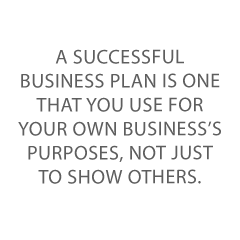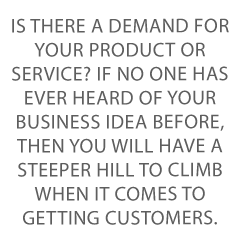Given the million and one things you have to do as a small business owner (particularly as a new business owner), you may be wondering: is a business plan worth the time and effort?
Yes! And in this blog post, I will tell you exactly why a business plan matters now, more than ever, to your success.
Benefits Of Developing A Business Plan
Benefit 1 – Business Planning
It may seem so obvious that it should not need to be mentioned. But the chief aim of a good business plan is good old fashioned business planning. It is a financial plan and even a mission statement for your business.
An effective business plan will include a financial forecast, which you can use to determine if you can wrestle your ideal customer for a competitor.
Add a goal or two or twelve. Consider a timeline for success. Record your sure things, your maybes, and your pie in the sky notions. Add your projections, as you move from being, say, a sole proprietorship to a going concern.
In short, do not treat your business plan as if it were a document for someone else. Rather, treat it like what it is exactly supposed to be—a document where you plan business growth and chart your future.
 A successful business plan is one that you use for your own business’s purposes, not just to show others.
A successful business plan is one that you use for your own business’s purposes, not just to show others.
Benefit 2 – Information for a Potential Investor or Lender
Would you buy a house you had never set foot in? Would you buy into a startup business that hasn’t even got off the ground yet? The answer to the first question is probably: ‘no’. But the answer to the second question can be ‘yes’. But only if you have some information.
What sort of investors would be interested in a new business? An angel investor, or even a venture capitalist might be. Virtually any venture capital firm will require a business plan before they will even look at your business.
A traditional lending institution will most likely want to see your strategic plan, too. Consider it from their perspective: a new company and a first-time entrepreneur are going to appear to be very risky to them.
The best way for you to allay their concerns is with a startup business plan.
Benefit 3 – Marketing Strategy
A number of data points from your marketing research go into a traditional business plan. This is things like a feasibility study and market analysis.
One of the main reasons why a small business will fail is because the entrepreneur did not engage in any (or sufficient) strategic planning. And the biggest area for business planning is in the area of marketing.
Does your target market share align with your financial projections? Or are you just winging it?
And consider this—if you don’t know if potential customers will even like your business idea, you may as well just toss your business into the trash. Because you are setting your small business and yourself up for failure.
While analyzing your market in depth may be time consuming, and researching a marketing plan may be costly, consider the alternative.
Benefit 4 – Information for the SBA or a Credit Issuer
Why does the Small Business Administration want to see a business plan? It’s because they want to know if your small business is more likely to succeed, or fail.
Can you get your value proposition across to them? Do you understand your competitive advantage, and can you communicate it to them effectively?
Because if you cannot clearly articulate your business proposition to them, then how can they expect your sales team to be able to do the same for your customers and prospects?
Both the SBA and credit issuers want to know how you’ve been getting along so far. Hence, they want to know your credit scores and about whatever money you’ve raised or earned already.
But they also want to know about how you envision the future of your business and yourself. This is why a great business plan matters so much to them.
How To Write A Business Plan
Step 1 – Consider Your Target Audience and Write an Executive Summary
Your target audience is who is actually going to read your business plan. And your executive summary is a general outline of your business.
It describes the kind of business you are in (or are going into). And it outlines your product and/or service on offer. Get the reader interested in your business, so they will want to read on.
If you don’t write to your target customer and/or target lender, then your plan is going to be abandoned by the very people you most need to read all the way through it.
Essentially, this is the communications part of your plan. Can you give your readers what they are looking for, quickly? Do not make them hunt through several pages to find your biggest points.
Good design (see Step #4, below) will also communicate what entrepreneurs feel is most important in a plan. You will also need to add personal information here.
Step 2 – Add a Strategies Section and Perform Research
In your strategies section, you will go into detail about your marketing plan.
Where will your business be located? If it’s not purely online, then you will need to account for real estate here. Will your business be in a swanky section of town, where the rents are high? Or a working class area where the clientele will spend less money?
Who will be on your management team?
 Perform some market research. Is there a demand for your product or service? If no one has ever heard of your business idea before, then you will have a steeper hill to climb when it comes to getting customers.
Perform some market research. Is there a demand for your product or service? If no one has ever heard of your business idea before, then you will have a steeper hill to climb when it comes to getting customers.
It’s not impossible, but you will have to spend some of your time and budget and marketing efforts convincing your target market that they want and need whatever it is that you are selling.
Step 3 – Include Your Analysis of Audience and Competitive Analysis
An analysis of your audience answers the following questions:
- What need will your business fill, and for whom?
- How will your product or service (business) fulfill that need?
This is the part of the plan where you will show that you are laser-focused on your target market. Demonstrate that you will serve them well in the years to come. Show that your business model puts your customer first.
Your competitive analysis will answer these questions:
- Is there already a competitor business working to fill this particular need?
- Is there room for more than one business in this space?
- How do you plan to compete with them?
Are your financial projections realistic in the face of your competition? After all, ignoring the competition will not make them go away.
Step 4 – Add Your Plans for Design and Development and Operation Management
Here is where you will explain how the process will play out, from start to finish. What steps are you going to take? Basically, it is a more detailed version of your strategies section.
Do you have a plan for operation management? You’re the entrepreneur, but will you actually own the business? Will you run its day to day operations?
Add a financial statement about the money you currently have, and financial projections to cover the money you anticipate your business will be able to bring in.
If your business is already a going concern, then here’s a good place to add a cash flow statement and an income statement.
An appendix is optional although it can be useful. Also, if you can get your business plan professionally designed and packaged, that will help.
Takeaways
Yes, a comprehensive business plan is going to take some time and effort for entrepreneurs. And, if you have a professional prepare all or part of it, it is going to involve some expense as well. This may be an expense that feels hard to justify when your cash flow is still uneven.
But all that money, time, and effort spent in creating your business plan should be seen as an investment in your future business success. And it helps to nail down your business idea and your business goals.
And a written business plan gives shape to financial planning for entrepreneurs.
Contact us today to learn more about what goes into your plan, and how else you can achieve Fundability™ to get the business credit and financing you need.

